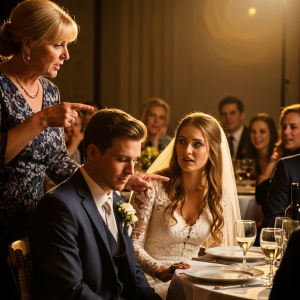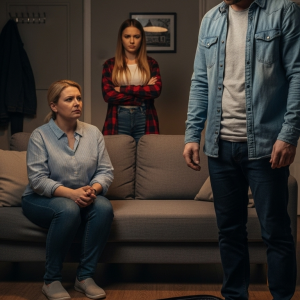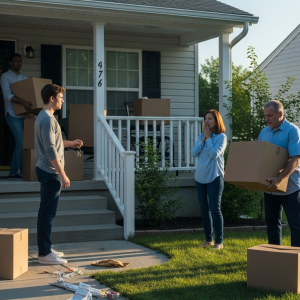I never imagined I’d be broadcasting my life story online, but here I am. At thirty-two, my world was upended in a way I could never have foreseen. I was cast out of my own home by my parents. The reason? I had the audacity to secure funding for my MBA without their help, and my sister, the family’s “Golden Child,” couldn’t stand it.
Let me paint a picture of my family dynamic. Growing up just outside Chicago, I was always the underdog. My sister, Sarah, was the sun around which my parents orbited. If she got an ‘A’, they’d throw a parade. If I got an ‘A’, it was, “Oh, that’s nice. What’s for dinner?” Sarah was the effortless star: prettier, more popular, the lead in every school play, the captain of every team. I was the quiet, bookish one, content to stay in my room with my code.
When Sarah got into a prestigious business school, my parents spared no expense. Tuition, a chic apartment, spring break trips to Cancun—it was all covered. They boasted about their “successful daughter” to anyone who would listen. Meanwhile, I put myself through college, graduating with honors in computer science through a patchwork of part-time jobs and student loans. My reward? A tepid, “That’s nice, dear. Have you seen the photos from Sarah’s graduation? Wasn’t she beautiful?”
Years later, I was a project manager at a tech firm. It was a good job, but I craved more. I set my sights on a top-tier MBA program. The tuition was astronomical—a six-figure sum. I hoped, perhaps naively, that my parents might finally offer some support. After all, they’d funded Sarah’s entire education.
One evening, after a family dinner that revolved, as always, around Sarah’s latest promotion at the family restaurant, I laid out my plan. I detailed the program, the career potential, and then, tactfully, the cost. The look on their faces—you would have thought I’d asked them to sell their kidneys.
They flatly refused. Not just to pay, which I could have understood, but to even co-sign a loan. That’s what stung.
“We’ve already paid for Sarah’s education,” my father said, his tone final. “We have to think about our retirement now. And the restaurant.” It turned out they were pouring their savings into a major expansion of the family business.
“So you can fund her entire degree, but you can’t even co-sign a loan for me?” I asked, my voice trembling with a frustration I’d suppressed for years.
My mother’s reply was a knife to the heart. “Honey, Sarah’s education was an investment in the family. Your MBA… that’s just for you, isn’t it?”
Just for me. As if I wasn’t family. As if my success meant nothing to them.
Defeated but not broken, I turned to the one person I knew I could count on: my Aunt Margaret. My dad’s older sister, a brilliant neurosurgeon, she was the black sheep of his generation, and her success had always been a source of unspoken resentment for my parents. She listened to my story and didn’t hesitate.
“Of course, I’ll help,” she said warmly. “It would be an honor to invest in your future. I’ve always seen your potential.” I begged her to keep it a secret, knowing my father would erupt if he knew I’d gone to his sister for help. She understood the toxic dynamics and agreed.
For a while, everything was perfect. With my tuition secured, I was ready to start my new life. I felt, for the first time, like I was winning.
And that’s when Sarah decided to destroy it all.
I came home one evening, excited to talk about my MBA orientation, but the house was deathly quiet. A thick, heavy tension hung in the air. I walked into the living room and my heart stopped. Everything I owned—my books, my clothes, my entire life—was packed into cardboard boxes.
My parents were on the sofa, their faces a mask of rage and disappointment. And Sarah stood to the side, a corner of her mouth lifted in a smirk of serene satisfaction.
“Explain this,” my father said, throwing a sheaf of papers at me.
With trembling hands, I looked at them. They were printouts of emails between me and Aunt Margaret. But they weren’t real. Sarah had doctored them. She had taken my genuine emails and expertly woven in fake conversations, making it look like I was selling the family restaurant’s trade secrets—recipes, supplier lists, financial data—in exchange for my tuition. She had painted me as a corporate spy, a traitor in our own home.
“This isn’t real,” I stammered, the air rushing from my lungs. “These are fake! I would never—”
But they wouldn’t listen. My mother was weeping, and my father’s face was a blotchy, furious red. “We trusted you,” he spat, “and you stabbed us in the back.”
Their faith in Sarah was absolute. My years of being the dutiful, quiet daughter meant nothing. In their eyes, I would always be second best, always suspect.
“Get out,” my father said, his voice dropping to a glacial calm. “We will not have a traitor under this roof.”
I pleaded. I tried to explain. But they were deaf to it. Sarah just stood there, watching, her victory complete. The rival sister was finally being exiled.
I loaded my few boxes into my car as neighbors peeked through their curtains. Alone, betrayed, and utterly humiliated, I drove away and called Aunt Margaret, my sobs so violent I could barely speak. Without a moment’s hesitation, she said, “Come to my place. Now.”
Three years passed. Three years of radio silence.
Those years transformed me. I buried my pain and rage in my studies, graduating at the top of my MBA class. The timid girl who lived in her sister’s shadow was gone, replaced by a confident woman who knew her worth. I landed a coveted job at a top consulting firm, a high-pressure environment where my talent was finally the only thing that mattered.
Aunt Margaret became the family I never truly had. Our weekly dinners were my sanctuary. She was my rock.
I built a life I was proud of, free from the constant need for their approval. I thought I had moved on.
Then, last Saturday, Sarah appeared at my door.
I almost didn’t recognize her. The polished, “Golden Child” veneer had cracked. She wore a faded sweater and jeans, dark circles hollowed out her eyes, and her hair was thrown into a messy bun. She looked defeated.
“Hey,” she mumbled. “Can we talk?”
My first instinct was to slam the door in her face. But curiosity—and perhaps a darker, colder part of me—won out. I let her in.
She perched awkwardly on the edge of my sofa. “The restaurant is in trouble,” she blurted out. “Serious trouble.”
The grand expansion had been a catastrophic failure. They had overextended, taken out massive loans, and were now drowning in debt. “Dad’s talking about bankruptcy,” her voice cracked. “Mom’s a mess. I’ve tried everything, but I can’t fix it.”
A wave of conflicting emotions washed over me: a grim satisfaction, a flicker of pity, and a profound sense of irony.
“Why are you telling me this?” I asked, my voice level. “What do you expect me to do?”
Her eyes filled with a desperate plea. “With your MBA… your new job… I thought maybe you could help. Give some advice, or…” She trailed off, but I knew what she was really asking for. She wanted a bailout. The Golden Child, now begging the black sheep for rescue.
“Let me get this straight,” I said, my voice dangerously calm. “After three years of silence, after what you did, you show up here asking for my help?”
To her credit, she had the grace to look ashamed. “I know I messed up,” she whispered. “I was jealous. You were always so smart, so capable. When I found out Aunt Margaret was helping you, I just… lost it. I’m sorry.”
A three-word apology for three years of hell. It was pathetic.
“Sorry doesn’t cut it, Sarah,” I replied. “You have no idea what you put me through.”
“I know,” she said, tears now streaming down her face. “But we’re still family, aren’t we? Family helps each other. Please, just think about it.”
Family. The word was like ash in my mouth. I told her I needed time. She left her number and scurried away.
I was torn. Part of me screamed to walk away and let them burn in the fire they had set. But another part, a stubborn, lingering part of the girl I used to be, felt a pull. Was this a chance to finally prove my worth? To show them exactly what they had thrown away?
Or was it a trap, pulling me back into the toxic cycle I had fought so hard to escape?
Aunt Margaret’s advice echoed in my head: “Be careful you’re not setting yourself on fire to keep them warm.”
A week after Sarah’s visit, the universe delivered its next shock. My parents showed up at my office.
My assistant buzzed me mid-meeting. “There are two people in the lobby asking for you,” she said, describing them. My blood ran cold. Excusing myself, I walked to the lobby like a woman walking to her own execution.
There they were. Older, more worn than I remembered. Dad’s shoulders were slumped in a way I’d never seen, and Mom’s hair was threaded with more gray than I remembered, a web of stress spun over three silent years.
“We need to talk,” Dad said, his voice rough.
I took them to a nearby coffee shop, unwilling to let their drama poison my sanctuary. We sat in a strained silence until my mother finally broke.
“We were wrong,” she said, her voice shaking. “We should have listened to you. We are so, so sorry.”
I had rehearsed this moment in my mind a thousand times. But now that it was here, I felt nothing. Just a hollow void. “Why now?” I asked. “Why after three years?”
They exchanged a look, and the rest of the story tumbled out. The restaurant wasn’t just failing; it was rotten to the core. To stay afloat, they hadn’t just taken out loans. They had broken the law. Tax evasion, health code violations, shady deals with suppliers. They weren’t just facing bankruptcy; they were facing criminal charges.
“We need your help,” Dad whispered, his voice barely audible. “Your business knowledge, your connections. You can save us.”
I sat there, stunned. They hadn’t come for forgiveness. They had come for a fixer. The daughter they had branded a traitor was now their only hope.
“So let me get this clear,” I said, the composure I fought for holding steady. “You throw me out based on a lie, cut me off for three years, and now you want me to risk my career and my principles to bail you out of your own illegal mess?”
“We know we don’t deserve it,” my mother cried, reaching for my hand. I pulled it away. “But we’re your family!”
That word again. As I looked at their desperate, selfish faces, I had a moment of pure clarity. They weren’t my family. Aunt Margaret was my family. My friends and colleagues who valued me for who I am—they were my family.
I took a deep breath. “I’m sorry,” I said, surprised by the calm in my own voice. “But I can’t help you. You’re not just asking for money. You’re asking me to sacrifice everything I have worked for. My reputation. My integrity. I won’t do it.”
Their shock was almost comical. They never imagined I would say no.
“After everything we’ve done for you?” Dad sputtered, anger replacing desperation.
“What have you done?” I shot back, the dam of my composure finally breaking. “Funded Sarah’s life while denying me a simple loan? Believed her lies without a second thought? Thrown me out of my own home?”
“We’ll be ruined!” my father yelled as I stood up to leave.
I turned back to face them one last time. “I want you to face the consequences of your actions,” I said, my voice low and clear. “I want you to understand, finally, what you lost when you threw me away. But most of all, I just want to be free.”
Walking out of that coffee shop felt like shedding a skin I had been trapped in my entire life. But it wasn’t over. Simply walking away wasn’t enough. They had broken the law, and other people could be harmed.
So I made the hardest decision of my life. I reported everything I knew about the restaurant’s illegal activities to the authorities—the IRS, the health department, the police.
The fallout was immediate. Hysterical calls from Sarah, accusing me of destroying the family. Voicemails from my parents, alternating between pathetic pleas and empty threats. I didn’t back down. Aunt Margaret stood by me, assuring me I was doing the right, ethical thing.
The restaurant has been shut down pending a full investigation. My parents and Sarah are facing serious legal consequences. It’s not a happy ending, but it is a just one.
And me? I am better than alright. I am free. The promotion I was up for came through. My life is filled with people who genuinely care for me. The toxic ties that held me back for so long have been severed. This is my story of rebirth, and I am proud of the woman I have become. Sometimes, the family you choose is the only one that truly matters.




